Items
Theme is exactly
Gay Youth
-
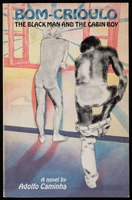 Bom-Crioulo : the Black man and the cabin boy Brazilian novelist Adolfo Caminha (1867-1897) wrote in the Romantic Naturalist tradition. His work, “polemic, provocative, misunderstood”, according to Raul de Sá Barbosa, who introduces this edition, was largely overlooked in conservative Brazil until it began to be revived in the early 1980s. ‘Bom-Crioulo’, which roughly translates as ‘the Good Black Man’, was first published in Rio de Janeiro in 1895, the same year as Oscar Wilde’s trial and just seven years after the abolition of slavery in Brazil. It depicts, frankly and without moralising, the relationship between a formerly enslaved Black man and a fifteen-year-old white cabin boy. E.A. Lacey, a noted gay poet of the post-Stonewall era, who translated ‘Bom-Crioulo’ from Portuguese, also translated Luis Zapata’s ‘Adonis García’ (another seized book) from Spanish.
Bom-Crioulo : the Black man and the cabin boy Brazilian novelist Adolfo Caminha (1867-1897) wrote in the Romantic Naturalist tradition. His work, “polemic, provocative, misunderstood”, according to Raul de Sá Barbosa, who introduces this edition, was largely overlooked in conservative Brazil until it began to be revived in the early 1980s. ‘Bom-Crioulo’, which roughly translates as ‘the Good Black Man’, was first published in Rio de Janeiro in 1895, the same year as Oscar Wilde’s trial and just seven years after the abolition of slavery in Brazil. It depicts, frankly and without moralising, the relationship between a formerly enslaved Black man and a fifteen-year-old white cabin boy. E.A. Lacey, a noted gay poet of the post-Stonewall era, who translated ‘Bom-Crioulo’ from Portuguese, also translated Luis Zapata’s ‘Adonis García’ (another seized book) from Spanish. -
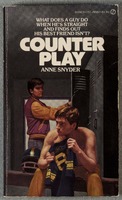 Counter play A high school football novel about friends Brad and Alex, one straight, one gay. Alex’s sexuality is revealed in the first few pages, but remains central to the plot, as Brad is forced to choose between his friend and his wider community. Anne Snyder (1922-2001) wrote seventeen books, mainly young adult ‘problem novels’ which explored issues such as alcoholism, homelessness and anorexia. She collaborated with Louis Pelletier on several titles. Originally marketed as an adult novel, ‘Counter Play’ was republished in 1987 as ‘The Truth about Alex’ and was adapted into a television movie of the same name, broadcast by HBO. Teen heartthrob Scott Baio (Chachi from ‘Happy Days’) played the character of Brad.
Counter play A high school football novel about friends Brad and Alex, one straight, one gay. Alex’s sexuality is revealed in the first few pages, but remains central to the plot, as Brad is forced to choose between his friend and his wider community. Anne Snyder (1922-2001) wrote seventeen books, mainly young adult ‘problem novels’ which explored issues such as alcoholism, homelessness and anorexia. She collaborated with Louis Pelletier on several titles. Originally marketed as an adult novel, ‘Counter Play’ was republished in 1987 as ‘The Truth about Alex’ and was adapted into a television movie of the same name, broadcast by HBO. Teen heartthrob Scott Baio (Chachi from ‘Happy Days’) played the character of Brad. -
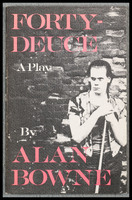 Forty-deuce : a play This dark play was first performed Off Off-Broadway in 1981 and gave Kevin Bacon (seen here on the cover) an early, award-winning role. The play’s title is a riff on both the tennis score and a junction at New York's 42nd Street known as ‘the Deuce’, where sex shops, porn cinemas and peep shows were clustered. The play, by Alan Bowne (1945-1989), depicts the death and exploitation of a young boy alongside a critique of commodity culture and was published by Felice Picano’s Sea Horse Press. Sea Horse Press was one of the Gay Presses of New York collective, which worked to increase the visibility of gay books.
Forty-deuce : a play This dark play was first performed Off Off-Broadway in 1981 and gave Kevin Bacon (seen here on the cover) an early, award-winning role. The play’s title is a riff on both the tennis score and a junction at New York's 42nd Street known as ‘the Deuce’, where sex shops, porn cinemas and peep shows were clustered. The play, by Alan Bowne (1945-1989), depicts the death and exploitation of a young boy alongside a critique of commodity culture and was published by Felice Picano’s Sea Horse Press. Sea Horse Press was one of the Gay Presses of New York collective, which worked to increase the visibility of gay books. -
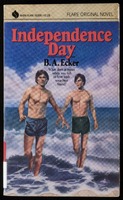 Independence day “What does it mean when you fall in love with your best friend?”, asks the cover of this coming-of-age story, which depicts identically clad high-school students Mike and Todd. Mike decides to tell Todd how he feels about him on 4 July – Independence Day in the US – and although Todd does not feel the same, this proto-Young Adult novel models understanding and acceptance. By its close, Mike has “dated several guys” in college and is taking a course “to become a counselor to gay kids”. B.A. Ecker includes a reference to another of the books erroneously seized in ‘Operation Tiger’, Patricia Nell Warren’s ‘The Front Runner’ (1974), which Mike “really found some comfort reading”. ‘Independence Day’ appears to be Ecker’s only published work.
Independence day “What does it mean when you fall in love with your best friend?”, asks the cover of this coming-of-age story, which depicts identically clad high-school students Mike and Todd. Mike decides to tell Todd how he feels about him on 4 July – Independence Day in the US – and although Todd does not feel the same, this proto-Young Adult novel models understanding and acceptance. By its close, Mike has “dated several guys” in college and is taking a course “to become a counselor to gay kids”. B.A. Ecker includes a reference to another of the books erroneously seized in ‘Operation Tiger’, Patricia Nell Warren’s ‘The Front Runner’ (1974), which Mike “really found some comfort reading”. ‘Independence Day’ appears to be Ecker’s only published work. -
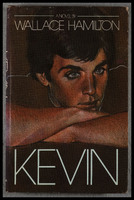 Kevin Wallace Hamilton came out in his fifties, moved to Greenwich Village and began writing popular books and plays about the queer community. ‘Kevin’, about a relationship between a teenage runaway and a professional man in his mid-thirties, draws in part on Hamilton’s own experiences. Hamilton died after a fall at his home in 1983, aged 64. Various obituaries note his involvement in the international paedophilia advocacy organisation NAMBLA (North American Man/Boy Love Association). Criticised by one contemporary reviewer for its sentimentality and lack of realism, readers of ‘Kevin’ today may have more serious concerns about the abusive power dynamics at play. Hamilton’s novel ‘Coming Out’ (1977) was also seized in ‘Operation Tiger’.
Kevin Wallace Hamilton came out in his fifties, moved to Greenwich Village and began writing popular books and plays about the queer community. ‘Kevin’, about a relationship between a teenage runaway and a professional man in his mid-thirties, draws in part on Hamilton’s own experiences. Hamilton died after a fall at his home in 1983, aged 64. Various obituaries note his involvement in the international paedophilia advocacy organisation NAMBLA (North American Man/Boy Love Association). Criticised by one contemporary reviewer for its sentimentality and lack of realism, readers of ‘Kevin’ today may have more serious concerns about the abusive power dynamics at play. Hamilton’s novel ‘Coming Out’ (1977) was also seized in ‘Operation Tiger’. -
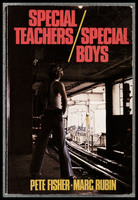 Special teachers/special boys “What happens here when a teacher comes out?” is the question this novel explores. The “here” is the fictional Lennox School for troubled boys, who are taught in small groups by a dedicated teacher – the special boys and special teachers of the title. Amongst the teachers is Bob Davidson, who is gay and comes out publicly on a television programme, an act which reverberates through the school and gives courage to two gay pupils. The novel was criticised in some quarters for the style of writing but praised for providing an antidote to prejudicial accounts of gay teachers. The authors, Peter Fisher (1944-2012) and Marc Rubin (1932-2007), were both gay activists. Rubin was also a teacher, and the book draws on his own experiences. It is dedicated to “the staff and boys of ‘The Lennox School’”.
Special teachers/special boys “What happens here when a teacher comes out?” is the question this novel explores. The “here” is the fictional Lennox School for troubled boys, who are taught in small groups by a dedicated teacher – the special boys and special teachers of the title. Amongst the teachers is Bob Davidson, who is gay and comes out publicly on a television programme, an act which reverberates through the school and gives courage to two gay pupils. The novel was criticised in some quarters for the style of writing but praised for providing an antidote to prejudicial accounts of gay teachers. The authors, Peter Fisher (1944-2012) and Marc Rubin (1932-2007), were both gay activists. Rubin was also a teacher, and the book draws on his own experiences. It is dedicated to “the staff and boys of ‘The Lennox School’”. -
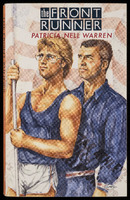 The front runner After the Stonewall Uprising, many mainstream publishers realised they could have commercial success with gay fiction. ‘The Front Runner’ was the first bestselling novel of this era, selling millions of copies when first published in 1974 by William Morrow. The story concerns Billy Sive, a young, gay athlete training for the 1976 Olympics, and his relationship with his older sports coach. Patricia Nell Warren (1936-2019), who was also an athlete, considered the novel’s publication to be a step in her own coming-out process. Latterly, Warren self-published lesbian fiction under the Wildcat Press imprint, fought online censorship laws and was one of the initial fifty nominees for the National LGBTQ Wall of Honor in New York City. The edition seized was probably the 1975 Bantam Books paperback rather than the one on display here.
The front runner After the Stonewall Uprising, many mainstream publishers realised they could have commercial success with gay fiction. ‘The Front Runner’ was the first bestselling novel of this era, selling millions of copies when first published in 1974 by William Morrow. The story concerns Billy Sive, a young, gay athlete training for the 1976 Olympics, and his relationship with his older sports coach. Patricia Nell Warren (1936-2019), who was also an athlete, considered the novel’s publication to be a step in her own coming-out process. Latterly, Warren self-published lesbian fiction under the Wildcat Press imprint, fought online censorship laws and was one of the initial fifty nominees for the National LGBTQ Wall of Honor in New York City. The edition seized was probably the 1975 Bantam Books paperback rather than the one on display here. -
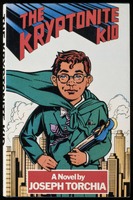 The Kryptonite kid : a novel An affecting novel of one-sided letters to Superman from schoolboy Jerry Chariot and his best friend Robert Sipanno. Filled with a mixture of curiosity and naivety (down to the preservation of Jerry’s childlike spelling and grammar), the letters wrestle with everyday problems of homelife, hero-worship and Catholic schooling as well as questions about what “a queer” is and whether Superman pees out of his “Thing”. Joseph Torchia (1946-1996), a journalist for various newspapers on the West Coast of the US, published one other full-length work and a short story, and wrote two further unpublished novels. He turned to photography later in life. His papers are held at Stanford University.
The Kryptonite kid : a novel An affecting novel of one-sided letters to Superman from schoolboy Jerry Chariot and his best friend Robert Sipanno. Filled with a mixture of curiosity and naivety (down to the preservation of Jerry’s childlike spelling and grammar), the letters wrestle with everyday problems of homelife, hero-worship and Catholic schooling as well as questions about what “a queer” is and whether Superman pees out of his “Thing”. Joseph Torchia (1946-1996), a journalist for various newspapers on the West Coast of the US, published one other full-length work and a short story, and wrote two further unpublished novels. He turned to photography later in life. His papers are held at Stanford University. -
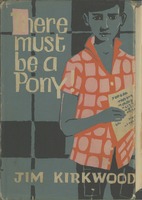 There must be a pony! Written in a style distinctly reminiscent of J.D. Salinger’s ‘The Catcher in the Rye’ (1951), this is the story of “sensitive” sixteen-year-old Josh, his film star mother Rita Cydney, and her relationship with the mysterious Ben. Its queer content is largely subtextual, but a 1963 write-up in the ‘Mattachine Review’ by Gene Damon (pseudonym of legendary lesbian bibliographer Barbara Grier) noted its “sensitive handling of a boy’s first comprehension of homosexuality, with the aid of an older, well-presented man”. ‘There Must Be a Pony!’ was adapted into a television drama in 1986, starring Elizabeth Taylor as Rita. James Kirkwood (1924-1989) stated in an interview that the book was based on his own relationship with his mother, actress and silent film star Lila Lee, about whom he said, “She should have had puppies or kittens, not a kid”. Kirkwood’s ‘'P.S. Your Cat is Dead’ was also seized in ‘Operation Tiger’.
There must be a pony! Written in a style distinctly reminiscent of J.D. Salinger’s ‘The Catcher in the Rye’ (1951), this is the story of “sensitive” sixteen-year-old Josh, his film star mother Rita Cydney, and her relationship with the mysterious Ben. Its queer content is largely subtextual, but a 1963 write-up in the ‘Mattachine Review’ by Gene Damon (pseudonym of legendary lesbian bibliographer Barbara Grier) noted its “sensitive handling of a boy’s first comprehension of homosexuality, with the aid of an older, well-presented man”. ‘There Must Be a Pony!’ was adapted into a television drama in 1986, starring Elizabeth Taylor as Rita. James Kirkwood (1924-1989) stated in an interview that the book was based on his own relationship with his mother, actress and silent film star Lila Lee, about whom he said, “She should have had puppies or kittens, not a kid”. Kirkwood’s ‘'P.S. Your Cat is Dead’ was also seized in ‘Operation Tiger’.
